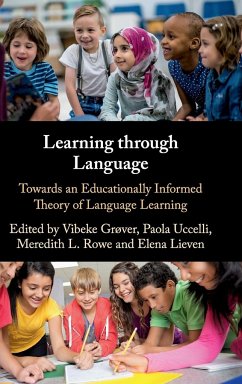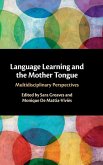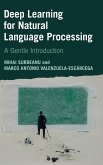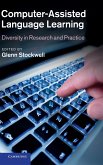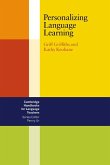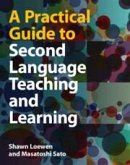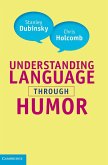Learning through Language
Herausgeber: Grøver, Vibeke; Uccelli, Paola; Rowe, Meredith
Learning through Language
Herausgeber: Grøver, Vibeke; Uccelli, Paola; Rowe, Meredith
- Gebundenes Buch
- Merkliste
- Auf die Merkliste
- Bewerten Bewerten
- Teilen
- Produkt teilen
- Produkterinnerung
- Produkterinnerung
Explores how children develop linguistic and literary competence from early childhood into adolescence, in a diverse range of linguistic contexts.
Andere Kunden interessierten sich auch für
![Language Learning and the Mother Tongue Language Learning and the Mother Tongue]() Language Learning and the Mother Tongue113,99 €
Language Learning and the Mother Tongue113,99 €![Deep Learning for Natural Language Processing Deep Learning for Natural Language Processing]() Mihai SurdeanuDeep Learning for Natural Language Processing124,99 €
Mihai SurdeanuDeep Learning for Natural Language Processing124,99 €![Computer-Assisted Language Learning Computer-Assisted Language Learning]() Computer-Assisted Language Learning116,99 €
Computer-Assisted Language Learning116,99 €![Pragmatics in English Language Learning Pragmatics in English Language Learning]() Pragmatics in English Language Learning109,99 €
Pragmatics in English Language Learning109,99 €![Personalizing Language Learning Personalizing Language Learning]() Griff GriffithsPersonalizing Language Learning48,99 €
Griff GriffithsPersonalizing Language Learning48,99 €![A Practical Guide to Second Language Teaching and Learning A Practical Guide to Second Language Teaching and Learning]() Shawn LoewenA Practical Guide to Second Language Teaching and Learning114,99 €
Shawn LoewenA Practical Guide to Second Language Teaching and Learning114,99 €![Understanding Language through Humor Understanding Language through Humor]() Stanley DubinskyUnderstanding Language through Humor90,99 €
Stanley DubinskyUnderstanding Language through Humor90,99 €-
-
-
Explores how children develop linguistic and literary competence from early childhood into adolescence, in a diverse range of linguistic contexts.
Hinweis: Dieser Artikel kann nur an eine deutsche Lieferadresse ausgeliefert werden.
Hinweis: Dieser Artikel kann nur an eine deutsche Lieferadresse ausgeliefert werden.
Produktdetails
- Produktdetails
- Verlag: Cambridge University Press
- Seitenzahl: 348
- Erscheinungstermin: 26. April 2019
- Englisch
- Abmessung: 235mm x 157mm x 23mm
- Gewicht: 657g
- ISBN-13: 9781107169357
- ISBN-10: 1107169356
- Artikelnr.: 54469479
- Herstellerkennzeichnung
- Books on Demand GmbH
- In de Tarpen 42
- 22848 Norderstedt
- info@bod.de
- 040 53433511
- Verlag: Cambridge University Press
- Seitenzahl: 348
- Erscheinungstermin: 26. April 2019
- Englisch
- Abmessung: 235mm x 157mm x 23mm
- Gewicht: 657g
- ISBN-13: 9781107169357
- ISBN-10: 1107169356
- Artikelnr.: 54469479
- Herstellerkennzeichnung
- Books on Demand GmbH
- In de Tarpen 42
- 22848 Norderstedt
- info@bod.de
- 040 53433511
1. Learning through language Vibeke Grøver, Paola Uccelli, Meredith L. Rowe
and Elena Lieven; Part I. Learning through Language during the Preschool
and Early Elementary School Years: 2. Input, interaction and learning in
early language development Elena Lieven; 3. Infants want input Paul L.
Harris; 4. Learning more than language through language during early
childhood Meredith L. Rowe; 5. Food for thought: turning everyday family
practices into opportunities to develop rich language and literacy
abilities in Latino children Diana Leyva and Lauren Skorb; 6. Theory- and
evidence-based language learning and teaching for young children: promoting
interactive talk in the classroom Young-Suk Grace Kim and Joonmo Yun; 7.
The relationship between early childhood development and later elementary
school performance in Chile Andrea Rolla, Macarena Alvarado, Bernardo
Atuesta, Marcela Marzolo, Ernesto Treviño, Hirokazu Yoshikawa and
Marycatherine Arbour; Discussion: reflections on learning through language
from infancy to preschool and early elementary school years Ageliki
Nicolopoulou; Part II. Learning through Language during the Middle School
and Early Adolescent Years: 8. Learning the language for school literacy:
research insights and a vision for a cross-linguistic research program
Paola Uccelli; 9. Observational research on vocabulary and comprehension in
upper elementary school classrooms Rebecca D. Silverman and Anna M.
Hartranft; 10. Improving struggling readers' literacy skills through talk
about text Lowry Hemphill, James Kim and Margaret Troyer; 11. Classroom
conversations as support for vocabulary learning: examining teacher talk as
input for student learning Evelyn Ford-Connors and Catherine O'Connor; 12.
Measurement of reading comprehension processing and growth Gina Biancarosa;
Discussion 1: time, complexity, and the enduring importance of words: key
themes in language learning in the middle years P. David Pearson;
Discussion 2: the road - via education - to humane social relationships is
driven by language (and literacy) Robert L. Selman; Part III. Learning
through More than One Language: 13. Young bilinguals' extended discourse
skills: the role of perspective-taking Vibeke Grøver; 14. How does
vocabulary instruction during book reading help Chinese young minority
children learn vocabulary in two languages? Si Chen; 15. Young monolingual
and bilingual children's exposure to academic language as related to
language development and school achievement: the DASH-project Paul P. M.
Leseman, Lotte F. Henrichs, Elma Blom and Josje Verhagen; 16.
Cross-linguistic relations among bilingual and biliterate learners C.
Patrick Proctor and Qianqian Zhang-Wu; 17. Pushing the limits: dual
language proficiency and reading development in the US and Canada Yuuko
Uchikoshi and Stefka H. Marinova-Todd; Discussion 1: bilingualism as action
Sara Rutherford-Quach and Kenji Hakuta; Discussion 2: multilingualism and
socioeconomic development Robert A. LeVine.
and Elena Lieven; Part I. Learning through Language during the Preschool
and Early Elementary School Years: 2. Input, interaction and learning in
early language development Elena Lieven; 3. Infants want input Paul L.
Harris; 4. Learning more than language through language during early
childhood Meredith L. Rowe; 5. Food for thought: turning everyday family
practices into opportunities to develop rich language and literacy
abilities in Latino children Diana Leyva and Lauren Skorb; 6. Theory- and
evidence-based language learning and teaching for young children: promoting
interactive talk in the classroom Young-Suk Grace Kim and Joonmo Yun; 7.
The relationship between early childhood development and later elementary
school performance in Chile Andrea Rolla, Macarena Alvarado, Bernardo
Atuesta, Marcela Marzolo, Ernesto Treviño, Hirokazu Yoshikawa and
Marycatherine Arbour; Discussion: reflections on learning through language
from infancy to preschool and early elementary school years Ageliki
Nicolopoulou; Part II. Learning through Language during the Middle School
and Early Adolescent Years: 8. Learning the language for school literacy:
research insights and a vision for a cross-linguistic research program
Paola Uccelli; 9. Observational research on vocabulary and comprehension in
upper elementary school classrooms Rebecca D. Silverman and Anna M.
Hartranft; 10. Improving struggling readers' literacy skills through talk
about text Lowry Hemphill, James Kim and Margaret Troyer; 11. Classroom
conversations as support for vocabulary learning: examining teacher talk as
input for student learning Evelyn Ford-Connors and Catherine O'Connor; 12.
Measurement of reading comprehension processing and growth Gina Biancarosa;
Discussion 1: time, complexity, and the enduring importance of words: key
themes in language learning in the middle years P. David Pearson;
Discussion 2: the road - via education - to humane social relationships is
driven by language (and literacy) Robert L. Selman; Part III. Learning
through More than One Language: 13. Young bilinguals' extended discourse
skills: the role of perspective-taking Vibeke Grøver; 14. How does
vocabulary instruction during book reading help Chinese young minority
children learn vocabulary in two languages? Si Chen; 15. Young monolingual
and bilingual children's exposure to academic language as related to
language development and school achievement: the DASH-project Paul P. M.
Leseman, Lotte F. Henrichs, Elma Blom and Josje Verhagen; 16.
Cross-linguistic relations among bilingual and biliterate learners C.
Patrick Proctor and Qianqian Zhang-Wu; 17. Pushing the limits: dual
language proficiency and reading development in the US and Canada Yuuko
Uchikoshi and Stefka H. Marinova-Todd; Discussion 1: bilingualism as action
Sara Rutherford-Quach and Kenji Hakuta; Discussion 2: multilingualism and
socioeconomic development Robert A. LeVine.
1. Learning through language Vibeke Grøver, Paola Uccelli, Meredith L. Rowe
and Elena Lieven; Part I. Learning through Language during the Preschool
and Early Elementary School Years: 2. Input, interaction and learning in
early language development Elena Lieven; 3. Infants want input Paul L.
Harris; 4. Learning more than language through language during early
childhood Meredith L. Rowe; 5. Food for thought: turning everyday family
practices into opportunities to develop rich language and literacy
abilities in Latino children Diana Leyva and Lauren Skorb; 6. Theory- and
evidence-based language learning and teaching for young children: promoting
interactive talk in the classroom Young-Suk Grace Kim and Joonmo Yun; 7.
The relationship between early childhood development and later elementary
school performance in Chile Andrea Rolla, Macarena Alvarado, Bernardo
Atuesta, Marcela Marzolo, Ernesto Treviño, Hirokazu Yoshikawa and
Marycatherine Arbour; Discussion: reflections on learning through language
from infancy to preschool and early elementary school years Ageliki
Nicolopoulou; Part II. Learning through Language during the Middle School
and Early Adolescent Years: 8. Learning the language for school literacy:
research insights and a vision for a cross-linguistic research program
Paola Uccelli; 9. Observational research on vocabulary and comprehension in
upper elementary school classrooms Rebecca D. Silverman and Anna M.
Hartranft; 10. Improving struggling readers' literacy skills through talk
about text Lowry Hemphill, James Kim and Margaret Troyer; 11. Classroom
conversations as support for vocabulary learning: examining teacher talk as
input for student learning Evelyn Ford-Connors and Catherine O'Connor; 12.
Measurement of reading comprehension processing and growth Gina Biancarosa;
Discussion 1: time, complexity, and the enduring importance of words: key
themes in language learning in the middle years P. David Pearson;
Discussion 2: the road - via education - to humane social relationships is
driven by language (and literacy) Robert L. Selman; Part III. Learning
through More than One Language: 13. Young bilinguals' extended discourse
skills: the role of perspective-taking Vibeke Grøver; 14. How does
vocabulary instruction during book reading help Chinese young minority
children learn vocabulary in two languages? Si Chen; 15. Young monolingual
and bilingual children's exposure to academic language as related to
language development and school achievement: the DASH-project Paul P. M.
Leseman, Lotte F. Henrichs, Elma Blom and Josje Verhagen; 16.
Cross-linguistic relations among bilingual and biliterate learners C.
Patrick Proctor and Qianqian Zhang-Wu; 17. Pushing the limits: dual
language proficiency and reading development in the US and Canada Yuuko
Uchikoshi and Stefka H. Marinova-Todd; Discussion 1: bilingualism as action
Sara Rutherford-Quach and Kenji Hakuta; Discussion 2: multilingualism and
socioeconomic development Robert A. LeVine.
and Elena Lieven; Part I. Learning through Language during the Preschool
and Early Elementary School Years: 2. Input, interaction and learning in
early language development Elena Lieven; 3. Infants want input Paul L.
Harris; 4. Learning more than language through language during early
childhood Meredith L. Rowe; 5. Food for thought: turning everyday family
practices into opportunities to develop rich language and literacy
abilities in Latino children Diana Leyva and Lauren Skorb; 6. Theory- and
evidence-based language learning and teaching for young children: promoting
interactive talk in the classroom Young-Suk Grace Kim and Joonmo Yun; 7.
The relationship between early childhood development and later elementary
school performance in Chile Andrea Rolla, Macarena Alvarado, Bernardo
Atuesta, Marcela Marzolo, Ernesto Treviño, Hirokazu Yoshikawa and
Marycatherine Arbour; Discussion: reflections on learning through language
from infancy to preschool and early elementary school years Ageliki
Nicolopoulou; Part II. Learning through Language during the Middle School
and Early Adolescent Years: 8. Learning the language for school literacy:
research insights and a vision for a cross-linguistic research program
Paola Uccelli; 9. Observational research on vocabulary and comprehension in
upper elementary school classrooms Rebecca D. Silverman and Anna M.
Hartranft; 10. Improving struggling readers' literacy skills through talk
about text Lowry Hemphill, James Kim and Margaret Troyer; 11. Classroom
conversations as support for vocabulary learning: examining teacher talk as
input for student learning Evelyn Ford-Connors and Catherine O'Connor; 12.
Measurement of reading comprehension processing and growth Gina Biancarosa;
Discussion 1: time, complexity, and the enduring importance of words: key
themes in language learning in the middle years P. David Pearson;
Discussion 2: the road - via education - to humane social relationships is
driven by language (and literacy) Robert L. Selman; Part III. Learning
through More than One Language: 13. Young bilinguals' extended discourse
skills: the role of perspective-taking Vibeke Grøver; 14. How does
vocabulary instruction during book reading help Chinese young minority
children learn vocabulary in two languages? Si Chen; 15. Young monolingual
and bilingual children's exposure to academic language as related to
language development and school achievement: the DASH-project Paul P. M.
Leseman, Lotte F. Henrichs, Elma Blom and Josje Verhagen; 16.
Cross-linguistic relations among bilingual and biliterate learners C.
Patrick Proctor and Qianqian Zhang-Wu; 17. Pushing the limits: dual
language proficiency and reading development in the US and Canada Yuuko
Uchikoshi and Stefka H. Marinova-Todd; Discussion 1: bilingualism as action
Sara Rutherford-Quach and Kenji Hakuta; Discussion 2: multilingualism and
socioeconomic development Robert A. LeVine.

